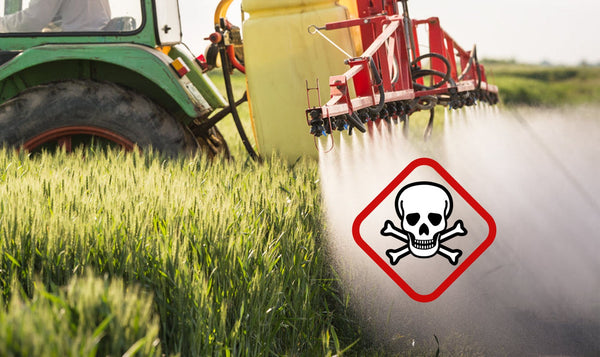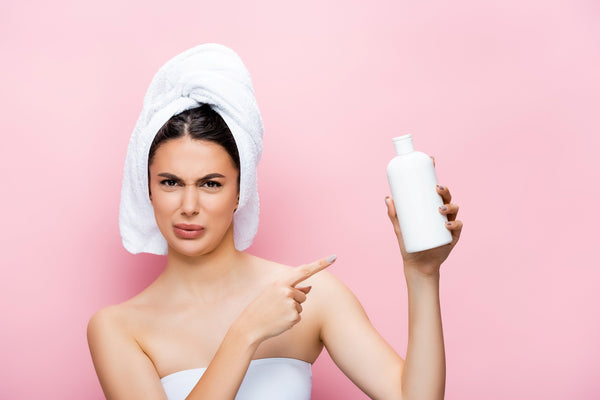What Causes Eczema? These 5 Things

Skincare Secrets: Episode 7
I developed eczema as an adult and I had no idea why. I spent years desperately trying to figure out the cause and a solution. I saw multiple dermatologists, did lots of research, and tried dozens of different things (skincare products, new diets, probiotics, steroid creams, etc.). Here's what I found and what worked for me (and can work for you).
Eczema is a skin condition that affects at least 10% of adults and up to 20% of children. Over 31 million Americans have eczema. The medical term for eczema is atopic dermatitis. Technically, there is no "cure" but there are things you can do to significantly reduce or even eliminate eczema symptoms. Source 1, 2
What causes eczema? Answer: The cause varies by person, but eczema is generally understood to be caused by one or several of the following five factors:
- 🚿Skincare Products - (I personally think this is the biggest factor for most people)
- 💦 Environment (especially low humidity)
- ⚡ Hormones (especially stress hormones)
- 🥗 Diet
- 🧬 Genetics
For most people, two or more factors in combination are required to cause or trigger their eczema symptoms. Let's examine all five factors and solutions for each.
CAUSE #1: 🚿SKINCARE PRODUCTS: Eczema is a SKIN condition, so obviously what you put on your skin will affect your skin and your eczema symptoms. I've spoken to hundreds of people with skin issues, and I believe that this is the #1 factor affecting most people's eczema and I know that it's the #1 factor affecting my eczema.
Here are the key culprits:
⚠️Problem #1: Drying skincare products. It may take one year or it may take ten years, but if you use drying skincare products, they'll eventually dry out your skin. This is common sense. One defining feature of eczema is...very dry skin. My eczema was largely caused by years of using drying soaps and bodywashes. Here's the thing: MOST soaps and bodywashes are drying. The ones that aren't are drying are usually not drying because they contain chemical additives (such as synthetic moisturizers), which leads us to culprit #2...

👆If it comes in a plastic bottle, it most likely contains chemical additives.
⚠️Problem #2: Chemical additives in skincare products. Chemical additives can cause skin dryness, skin irritation, and skin sensitivity—the 3 main characteristics of eczema! The skincare industry uses THOUSANDS of chemical additives.
Fragrances, for example. One fragrance can be made up of hundreds of chemicals. Fragrances can trigger allergic skin reactions in many people.
Another ubiquitous chemical additive is sodium lauryl sulfate or SLS. SLS is a detergent chemical that's a main ingredient in bodywash, soap, shampoo, toothpaste, and many other products. It's widely used because it adds foamy bubbles (lather). The problem is that it's a proven skin irritant. Source. In one clinical study of 1,600 testers, SLS caused skin irritation in 42% of those tested! Source. Many products now claim to be "SLS free" but what they don't tell you is that they've simply replaced SLS with near identical chemicals with different names but that have similar properties and similar irritability.

👆Best-selling body wash. Chemicals🧪, more chemicals🧪, plus extra chemicals.🧪
⚠️Problem #3: Residual pesticides and herbicides in skincare products. Over 5 billion pounds of pesticides are sprayed on planet earth yearly. One billion pounds just in the USA. Billion with a 'B'! Source. Those toxic chemicals are sprayed on plants. Soap and many other skincare products contain plant oils, which means residual pesticides and herbicides can end up in the products and in your body. Obviously, these toxic chemicals are MAJOR skin irritants but even worse, they're carcinogens.

melanoma = skin cancer
💡SKINCARE SOLUTION: Use skincare products that are: 1. moisturizing, 2. free of chemical additives, and 3. certified organic. Once I made this change, within 2 months, my eczema symptoms were essentially eliminated.
(It's also important to use fragrance-free laundry detergent because your clothes contact your skin.)

What is "chemical additive-free"? No fragrances. No added colors. No detergents. No synthetic moisturizers like EDTA. No preservatives.
Be careful because many companies CLAIM that their products are free of chemical additives when nothing could be further from the truth. For example, there is no such thing as "natural" fragrance. All fragrances are synthetic chemicals made in a lab. Fragrances contain phthalates, hormone-disrupting chemicals linked to a host of illnesses including cancer. Sources 1, 2, 3 Always read ingredient labels.
CAUSE #2: 💦ENVIRONMENT: Humidity and temperature can affect eczema symptoms. For example, prolonged exposure to a low humidity environment can dry out your skin. Air from A/C and heating systems is often quite dry so this is a common problem for many people, especially in the wintertime.
The presence of mold, dust, and pollen can also affect the skin, but these factors are difficult to identify, measure, & diagnose, and the skin response to these allergens varies widely from person to person.

💡ENVIRONMENT SOLUTIONS: Buy a couple hygrometers (they're less than $10) to measure humidity levels in your home. If your living space is consistently below ~35% humidity, get a humidifier. (I highly recommend a warm mist humidifier—which operates by boiling water—since it ensures that the mist is free of bacteria.) You will likely notice a difference in your skin and comfort. However, keep in mind that high humidity can trigger mold growth, which is obviously bad. Hence the importance of hygrometers to measure humidity levels.
Regarding the factors of mold, pollen, and dust, the solution is less straightforward. I think the best approach here is to take three reasonable steps: 1. Keep your place clean & dust-free. 2. Buy a HEPA air filter. 3. If you suspect you have a mold problem, call a pro to get the area checked. Mold remediation can be expensive but sometimes the solution is simply running a dehumidifier in the problem area.
CAUSE #3:⚡HORMONES: Cortisol is the hormone associated with stress. The more stressed you are, the more cortisol your body produces. The problem is that cortisol suppresses the body's immune system, which can trigger an inflammatory response in the skin. For this reason, stress is a common trigger of eczema outbreaks. Source. I've personally found that even if I'm using the right skincare products, if I'm very stressed, I'll have an eczema outbreak unless I'm managing my stress.

💡HORMONE SOLUTION: Take steps to manage your stress. Go for a quick jog. Take a relaxing bath.🛀Go for a walk. Watch a sitcom. Meditate for 5 minutes. Pray.🙏Play your favorite music.🎵 Write a gratitude journal. Call a friend. ☎️Speak to a therapist. We don't have to tackle life's problems on our own.
CAUSE #4: 🥗DIET: Food allergens can cause eczema symptoms for some people. For others, food is a non-factor or ambiguous. For me, it's a non-factor. I know this because I've tried almost every diet: gluten-free, dairy free, nut-free, sugar-free, vegetarian, vegan, etc., and none of them affected my eczema in any way. I'm currently vegan, but not because it helps my eczema (it doesn't).

💡DIET SOLUTION: Many people have found that eating a healthier diet improved their skin. Source (Healthier diet = less processed food, fewer animal products, more fruits & vegetables.) Some people found that specifically going dairy-free or avoiding seafood helped. Everyone is different. The only way to know is to try a new diet (for at least a couple months) and see if your skin changes. If you have an intuition that a particular food might be the culprit, consider eliminating that food.
"Many [eczema] patients find that when they eat a ‘cleaner’ diet, everything [their skin] gets better—not clear, mind you—but better, which is great,” Dr. Peter Lio, MD, Clinical Assistant Professor of Dermatology & Pediatrics at Northwestern Univ. Feinberg School of Medicine. Source.
CAUSE #5: 🧬GENETICS: Science has shown that eczema has a genetic component. Eczema runs in families. Source.

💡GENETICS SOLUTION: Get new parents.😅Seriously though, we can't change our genetics so we must simply do the best we can with the skin we have. Gratitude is always a helpful strategy in life. It may sound crazy but I'm grateful for my eczema. It has led me to become a skincare expert and to take much better care of my skin and my body. I'm so grateful for that.
SUMMARY: So, in conclusion, eczema is caused by one or more of the previously described factors, but the most common factors for most people are: Skincare products, your stress levels, and your environment.
To reduce your eczema symptoms:
-
- manage your stress
- manage the humidity in your home
- eat a healthy diet
- use fragrance-free laundry detergent
- use fragrance-free products in general
- and most importantly: use skincare products that are: 1. moisturizing, 2. certified organic, and 3. completely free of chemical additives (no detergents, no fragrances, no synthetic moisturizers, etc.)
Remember, eczema is a SKIN condition, so what you put on your skin matters.
Thanks for reading!
-Kal Garcia, Founder of S.M.O.C. Skincare. (More about Kal and S.M.O.C.)
Want to learn about the difference between soap and detergent? Check out this blog post.



